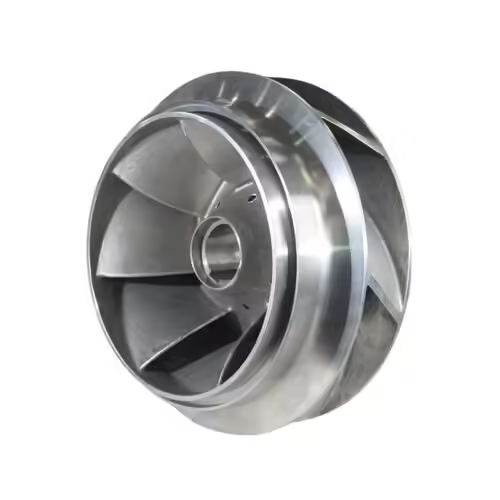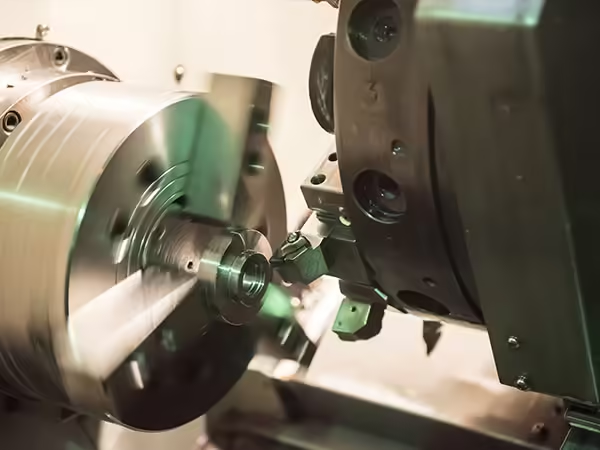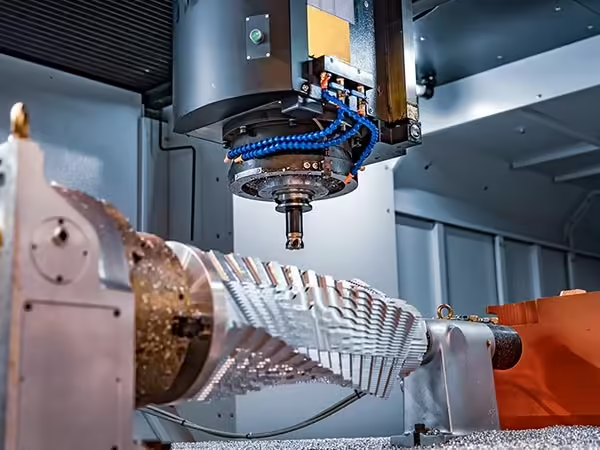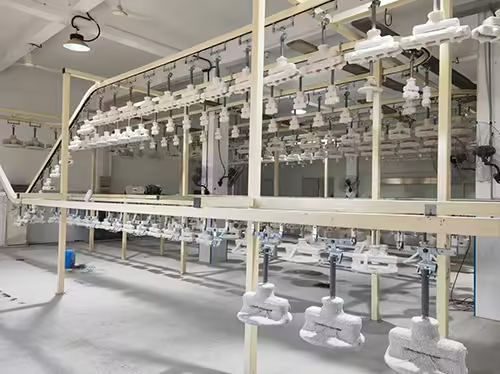5 señales de advertencia de malos fabricantes de impulsores de hierro fundido
¡Bienvenido a mi blog!
¡Me encanta tenerte aquí! Antes de profundizar en el contenido, me encantaría que me acompañaras en mis redes sociales. Es donde comparto información adicional, conecto con nuestra increíble comunidad y te mantengo al tanto de las últimas noticias. Así es como puedes mantenerte conectado:
📘 Facebook: Shanghai Leierwo Industria Comercio Co., Ltd.
¡Ahora, emprendamos este viaje juntos! Espero que el contenido aquí te resulte no solo revelador, sino también inspirador y valioso. ¡Comencemos!
Tabla de contenido
Introducción

Elegir lo correcto fabricantes de impulsores de hierro fundido Pueden determinar la eficiencia y la fiabilidad de sus sistemas de manejo de fluidos. Los impulsores de hierro fundido son componentes críticos utilizados en diversas industrias, como el tratamiento de aguas, el procesamiento químico, la climatización y la minería. Su resistencia, durabilidad y excelente rendimiento en entornos abrasivos los convierten en la opción preferida. Sin embargo, no todos los fabricantes mantienen los mismos estándares. Detectar las señales de advertencia a tiempo puede ahorrar tiempo, dinero y futuros problemas.
Este artículo analiza cinco señales de alerta sobre fabricantes de baja calidad y cómo identificar fabricantes confiables de impulsores de hierro fundido. Además, incluimos una tabla comparativa detallada para ayudarle a tomar decisiones informadas.
Mala calidad del material: una señal de alerta de Fabricantes de impulsores de hierro fundido
La base de todo impulsor duradero comienza con el material con el que está fabricado. Cuando se trata de identificar impulsores poco fiables fabricantes de impulsores de hierro fundido, La baja calidad de los materiales se destaca como una de las señales de alerta más graves. Si bien los impulsores deben funcionar en entornos exigentes —a menudo expuestos a alta presión, fluidos a alta velocidad y temperaturas extremas—, los materiales de baja calidad simplemente no resistirán.
El hierro fundido de baja calidad compromete la resistencia mecánica del impulsor. Esto puede ocasionar una menor vida útil, un rendimiento irregular y fallas mecánicas repentinas que paralizan sistemas enteros. En industrias críticas como el tratamiento de aguas, la climatización y el procesamiento químico, estas fallas pueden provocar importantes problemas de seguridad y pérdidas económicas.
Por qué importa la calidad del material
El hierro fundido utilizado en los impulsores debe cumplir con propiedades mecánicas y químicas específicas. Los fabricantes de impulsores de hierro fundido de confianza suelen trabajar con materiales que cumplen con estándares reconocidos internacionalmente, tales como:
- ASTM A48 (Fundición de hierro gris)
- EN-GJL-250 (Norma europea para hierro fundido gris)
Estas normas garantizan que el hierro fundido tenga la resistencia a la tracción, la dureza y la resistencia al desgaste adecuadas. Desviarse de estas especificaciones puede ahorrar costes a corto plazo, pero casi siempre conlleva una baja fiabilidad del producto.
Señales clave de mala calidad del hierro fundido
Estos son los indicadores más comunes de que el fabricante está utilizando materiales de baja calidad:
- fractura frágil durante los ciclos operativos típicos, incluso cuando no hay sobrecarga
- Discrepancias de peso inusuales, lo que sugiere una mezcla inadecuada de materiales o porosidad
- defectos superficiales como picaduras, porosidad o fisuras finas visibles durante la inspección.
- Se oxida demasiado rápido, lo cual puede indicar la falta de elementos de aleación adecuados.
Si alguno de estos signos aparece al principio del ciclo de vida del producto, podría indicar un defecto grave en el proceso de fabricación o el uso de materias primas baratas e inconsistentes.
Qué preguntarle al fabricante
Para mitigar riesgos, solicite siempre un Certificado de Análisis de Materiales (CAM) al fabricante. Este certificado detalla la composición química y las propiedades físicas del lote utilizado en su pedido. Un fabricante confiable le brindará total transparencia respecto a los materiales empleados.
Antes de firmar cualquier contrato de compra, confirme que el material cumple con las especificaciones requeridas para su aplicación. Si el proveedor se muestra reacio o evasivo al solicitarle dicha documentación, considérelo una señal de alerta importante.
Falta de certificaciones y cumplimiento de la normativa del sector

Acreditado fabricantes de impulsores de hierro fundido Suelen contar con certificaciones que demuestran su compromiso con la calidad y el cumplimiento de las normativas del sector. Estas pueden incluir la norma ISO 9001, el marcado CE o certificaciones de organismos regionales que regulan la fabricación industrial.
Si un fabricante evita hablar de las certificaciones o mostrarlas, o si afirma cumplir con las normas sin aportar pruebas, eso es otro motivo de gran preocupación. El incumplimiento puede conllevar:
- Impulsores que no superan la inspección
- Tiempo de inactividad operativa debido a falla de pieza
- Sanciones regulatorias en sectores estrictos
Las certificaciones no son meras formalidades; validan que el fabricante sigue procedimientos estandarizados, pruebas y controles de calidad durante todo el proceso de producción.
Producción inconsistente y entregas retrasadas: una señal de alerta logística
La entrega puntual y la calidad constante son fundamentales al elegir fabricantes confiables de impulsores de hierro fundido. Si experimenta retrasos frecuentes, volúmenes de producción inconsistentes o dimensiones de producto variables, es probable que el fabricante tenga deficiencias en el control de procesos.
Aquí tienes una comparación de los indicadores de calidad a tener en cuenta al elegir fabricantes de impulsores de hierro fundido:
| Criterios | Buen fabricante | Fabricante malo |
|---|---|---|
| El tiempo de entrega | Según lo previsto, predecible | Con frecuencia se retrasa |
| Precisión dimensional | Estrictamente controlado, dentro de los márgenes de tolerancia. | Variable, a menudo fuera de las especificaciones |
| Consistencia de lotes | Alta repetibilidad entre pedidos | Inconsistente, cada lote es diferente |
| Documentación de garantía de calidad | Integral y transparente | Mínimo o no proporcionado |
| Soporte al cliente | Capacidad de respuesta y conocimientos técnicos | No disponible o no cualificado |
Las inconsistencias no son solo un inconveniente, sino que pueden provocar importantes retrasos en el proyecto. Un fabricante que incumple frecuentemente los plazos de entrega o proporciona componentes poco fiables quizá no merezca su confianza ni su inversión.
Falta de personalización y soporte técnico
Confiable fabricantes de impulsores de hierro fundido Hay que tener en cuenta que no todos los clientes necesitan impulsores estándar. Algunas operaciones requieren configuraciones personalizadas, recubrimientos especializados o características de rendimiento específicas.
Si un fabricante solo ofrece modelos genéricos sin posibilidad de modificaciones técnicas ni personalización, demuestra una falta de conocimientos técnicos. La incapacidad para adaptarse a las especificaciones de diseño suele tener las siguientes consecuencias:
- Piezas defectuosas que comprometen el rendimiento del sistema
- Incompatibilidad con la carcasa o los conjuntos del motor
- Mayores costos operativos debido a ineficiencias
Pregunte al fabricante si ofrece servicios de consultoría de diseño, modelos CAD o simulaciones. Los fabricantes líderes suelen contar con un equipo de ingeniería interno para brindar apoyo a los clientes durante todo el ciclo de vida del proyecto.
Comentarios negativos de los clientes y falta de transparencia


Al evaluar a los fabricantes de impulsores de hierro fundido, la opinión de los clientes es uno de los indicadores más reveladores y accesibles de fiabilidad (o su ausencia). Las reseñas negativas o la falta de información transparente por parte de la empresa deberían generar preocupación de inmediato, sobre todo al invertir en componentes que desempeñan un papel fundamental en los sistemas industriales.
Los fabricantes de impulsores de hierro fundido que reciben constantemente malas calificaciones u ocultan detalles operativos esenciales suelen estar intentando encubrir problemas de calidad, deficiencias en el servicio o inestabilidad financiera. Las empresas confiables entienden que la transparencia genera confianza y relaciones a largo plazo. Abordan de forma proactiva las inquietudes, responden a los comentarios y facilitan sus datos de procesos, precios y productos cuando se les solicitan.
Patrones de comentarios negativos de los clientes
Es posible que incluso las mejores empresas reciban una o dos quejas aisladas, pero cuando se empieza a notar un patrón, especialmente en diferentes plataformas de reseñas o foros, eso es un fuerte indicador de problemas más profundos.
Entre las señales de alerta más comunes en los comentarios de los clientes se incluyen:
- Fallas frecuentes del impulsor Poco después de la instalación, a menudo debido a la mala calidad de los materiales o a la falta de un control de calidad adecuado.
- Horarios de entrega poco fiables, como por ejemplo, envíos tardíos o retrasos inesperados sin comunicación
- Prácticas de facturación engañosas o poco claras, donde los costos fluctúan sin una explicación clara
- Mal servicio postventa, especialmente en lo que respecta a reclamaciones de garantía, asistencia técnica o sustitución de piezas
- Servicio al cliente grosero o desdeñoso, lo que refleja una falta de compromiso con la satisfacción del cliente
Estos problemas afectan directamente a la estabilidad operativa, los plazos de los proyectos y la confianza general en el fabricante.
Por qué la transparencia importa en las alianzas de fabricación
La transparencia es más que una cualidad deseable: es una necesidad estratégica. En el mundo de la fabricación industrial, un proveedor que sea transparente sobre sus operaciones, el rendimiento de sus productos y su trayectoria siempre será más fiable que uno que se escude tras afirmaciones vagas.
Los fabricantes de impulsores de hierro fundido de renombre suelen estar orgullosos de sus logros y están más que dispuestos a compartirlos.
- Estudios de caso o informes de proyectos que describen implementaciones exitosas en diferentes industrias
- Referencias de clientes Puedes contactar para obtener reseñas de primera mano.
- Documentos técnicos, incluyendo certificaciones, planos dimensionales y protocolos de prueba
- Comunicación clara en lo que respecta a plazos de fabricación, tolerancias y condiciones de entrega
Por otro lado, un fabricante que duda en proporcionar incluso la documentación básica o evita las preguntas sobre proyectos anteriores demuestra una grave falta de responsabilidad.
¿Sin reseñas? Eso también es una señal de alerta.
Algunas empresas pueden no tener reseñas negativas simplemente porque carecen de presencia en línea. Esto no necesariamente es mejor. La falta de reseñas verificables, testimonios o referencias independientes puede indicar que la empresa es muy nueva, carece de experiencia en el mercado o evita deliberadamente el escrutinio público.
Antes de contactar con cualquier fabricante de impulsores de hierro fundido, asegúrese de:
- Comprueba su Perfil de empresa de Google, foros de la industria, LinkedIn, y reseñas de la comunidad de ingeniería
- Pedir derivaciones directas de clientes con los que han trabajado en su sector
- Buscar menciones en publicaciones del sector, exposiciones o directorios de proveedores
Cualquier empresa que evite recibir comentarios probablemente esté evitando rendir cuentas.
Reflexiones finales sobre la transparencia de los fabricantes
En un entorno de fabricación competitivo y de alto riesgo, no puede permitirse trabajar con un proveedor que se escude tras un lenguaje de marketing vago y respuestas evasivas. Cuanta más información tenga sobre un fabricante —buena o mala—, mejor preparado estará para tomar una decisión informada.
Si un fabricante de impulsores de hierro fundido no está dispuesto o no puede proporcionar pruebas verificables de su rendimiento, o si los clientes informan repetidamente de malas experiencias, no vale la pena correr el riesgo. Elija siempre un socio que valore la transparencia tanto como la calidad del producto.
Conclusión
Encontrar el adecuado fabricantes de impulsores de hierro fundido Realizar la debida diligencia. Evitar las empresas que presenten cualquiera de las cinco señales de alerta mencionadas anteriormente. Los mejores fabricantes:
- Utilice materiales certificados de alta calidad.
- Mantener la transparencia y el cumplimiento
- Entregar de forma consistente y puntual
- Brindar soporte de ingeniería y personalización
- Obtén reseñas positivas y mantén una comunicación abierta.
Al identificar estas características a tiempo, se reduce el riesgo operativo y se incrementa la vida útil y el rendimiento de los sistemas. Antes de establecer una relación comercial a largo plazo, siempre compare a los fabricantes en función de la calidad, la reputación y la capacidad de respuesta documentadas.
PREGUNTAS FRECUENTES
¿Qué certificaciones deberían fabricantes de impulsores de hierro fundido ¿tener?
Busque las certificaciones ISO 9001, CE y cualquier otra certificación local relevante para su región o sector. Estas confirman que el fabricante cumple con los estándares internacionales de calidad.
¿Puedo solicitar informes de ensayos de materiales de fabricantes de impulsores de hierro fundido?
Sí, los fabricantes de renombre proporcionarán sin problema informes de pruebas de materiales que verifican la composición y resistencia de sus productos de hierro fundido.
¿Cómo puedo saber si un fabricante ofrece personalización?
Ask for CAD support, prototyping options, or past examples of customized impellers. Leading manufacturers often include these as part of their services.
¿Qué industrias dependen más de los impulsores de hierro fundido?
Industries include water treatment, power generation, mining, oil and gas, chemical processing, and HVAC systems, where durability and corrosion resistance are critical.
¿Cuál es la mejor manera de evaluar a un fabricante antes de realizar un pedido grande?
Start with a small order or sample, request technical documentation, check reviews or case studies, and ideally visit their facility if possible.
Categorías de productos
- Piezas de válvulas
- Piezas de la bomba de agua
- Piezas de la caja de cojinetes
- Piezas de fundición a presión
- Productos para bombas de acero inoxidable
- Productos para bombas de hierro fundido
- Piezas de válvulas para automóviles
- Recambios para automóviles
- Piezas de válvulas para uso civil
- Piezas de bomba de vacío KF

